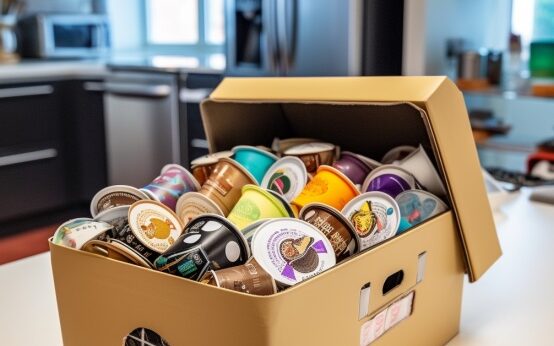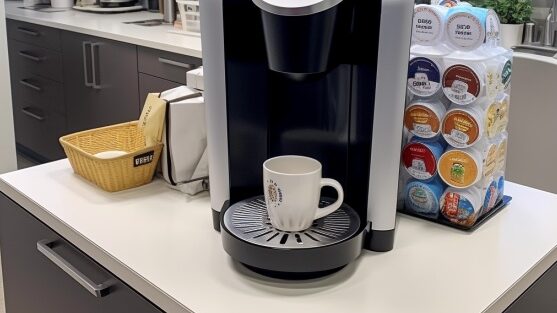Introduction – Are K-Cups Recyclable
Are K-Cups recyclable? The short answer is that K-cups and Keurig Pods as of 2023 are made from plastic #5 (also known as No. 5 plastic) and are therefore recyclable. Before 2020 they were made from plastic #7 and not recyclable. The long answer is that not all manufacturers make pods that are recyclable and it depends on the mix of materials. Read on to find out more. Coffee enthusiasts around the globe have embraced single-serve coffee machines and their convenient pods for a quick and consistent cup of java.

However, the popularity of K Cups and Keurig Pods, while convenient, has triggered growing concern about their impact on the environment. This article aims to shed light on the recyclability of these coffee pods, the challenges that surround their recycling process, and the eco-friendly alternatives you can consider. By exploring these aspects, we also reveal the benefits of recycling and adopting eco-friendly practices.
Background – Are K-Cups Recyclable
Brief history of K Cups and Keurig Pods
Before delving into the question of are k-cups recyclable, we’ll take a look at the invention and evolution of the products: K Cups were invented in the 1990s to meet the demand for single servings of coffee without compromising on taste. Keurig, a leading coffee brand, later introduced its line of single-serve brewers and pods. These innovations soon captured the market and revolutionized the way people brewed coffee at home and in the office.
Market share and consumer preferences: The single-serve coffee market has seen significant growth over the past years, with an increasing number of households and companies opting for these machines for their convenience and variety.
The impact of single-use plastics on the environment
Single-use plastics contribute to environmental pollution due to their non-biodegradable nature. Coffee pods, predominantly made from different types of plastic and aluminum, have a significant environmental footprint.
The Current State Of K Cups And Keurig Pods Recycling
Manufacturing materials of coffee pods
Coffee pods are primarily manufactured using a combination of different materials, primarily plastic #7, a mix of various other plastics, and aluminum. These materials, known for their durability and lightweight nature, are ideal for ensuring the freshness of the coffee grounds contained within.
The environmental impact these materials can have due to their non-biodegradable nature. When these pods are improperly disposed of, they contribute to the growing problem of landfills and plastic pollution in our oceans.
Challenges in recycling K Cups and Keurig Pods
Recycling K Cups and Keurig Pods poses several significant challenges. Firstly, the specific types of plastic used in these products, particularly plastic #7, are not accepted by all recycling facilities. As a result, coffee pods are often rejected by local recycling programs.
The task of recycling these pods is further complicated by the need to separate the various components within each pod. These include plastic, aluminum, and organic matter in the form of coffee grounds. Without this separation, the recycling process becomes cumbersome and inefficient.
Environmental and economic implications of improper disposal
Improper disposal of K Cups and Keurig Pods exacerbates the problem of overflowing landfills and marine pollution, negatively impacting ecosystems and incurring economic costs in the long run.

Solutions To Recycle K Cups And Keurig Pods – Are K-Cups Recyclable
Manufacturer-led initiatives
In response to the challenges and environmental concerns, several manufacturer-led initiatives have been put in place. Some manufacturers have taken steps to introduce recyclable coffee pods, which are made from plastic #5.
This type of plastic is more widely accepted in recycling programs, thereby improving the chances of these pods being recycled. Companies like Keurig have also taken proactive measures by implementing their recycling programs.
These programs enable customers to return used pods for recycling, thus promoting responsible disposal of these items. Beyond these measures, there is a growing trend among coffee companies to adopt environmentally-conscious practices as part of their corporate social responsibility efforts.
These initiatives are aimed at mitigating the environmental footprint of their products and operations.
How to recycle K Cups and Keurig Pods at home
1. Separating components for recycling: Disassemble the pods by removing the foil lid, discarding the coffee grounds, and cleaning the plastic shell for recycling.
2. Utilizing local recycling programs: Check with your local recycling facility to ensure their acceptance of coffee pod plastic for recycling.
3. Reusing coffee grounds and reducing waste: Used coffee grounds can be repurposed as compost, garden fertilizer, or even as natural cleaning agents.
4. DIY projects using coffee pods and creative upcycling: Upcycle K Cups and Keurig Pods into fun crafts, planters, or decorations.
Eco-friendly alternatives to K Cups and Keurig Pods
There are several eco-friendly alternatives to K Cups and Keurig Pods for coffee lovers who are mindful of their environmental impact.
One such option is investing in reusable coffee pods, which are often made from materials like stainless steel or plastic. These can be filled with any ground coffee of the consumer’s choosing.
There are also other sustainable coffee brewing methods to consider, such as using a French press, pour-over, or drip coffee maker. These methods are known to have a lower environmental impact compared to single-use pods.
Finally, coffee consumers can contribute to sustainability efforts by choosing to purchase Fairtrade and organic coffee beans. This supports ethical and environmentally responsible coffee producers, promoting more sustainable practices throughout the coffee supply chain.
The Role Of Consumers In Promoting Sustainable Practices – Are K-Cups Recyclable
Consumers play a critical role in promoting sustainable practices, especially in industries like coffee production.
One important way they can contribute is by supporting eco-friendly brands and products. This means choosing to buy from brands that prioritize sustainability and actively work to reduce their environmental footprint. In
A second way is that consumers can influence manufacturers by voicing their concerns and supporting initiatives aimed at promoting environmentally friendly practices within the coffee industry. By drawing attention to these issues, consumers can exert pressure on manufacturers to adopt more sustainable processes.
A third way is that consumers can extend their impact by adopting greener habits beyond their coffee consumption. This might include making efforts to reduce their use of single-use plastics and finding ways to conserve resources in their daily lives. Through these actions, consumers can make a significant contribution to sustainability efforts.
Conclusion – Are K-Cups Recyclable
There is undoubtedly a need for responsible recycling of coffee pods and a shift towards sustainable alternatives. By adapting to eco-friendly options and practicing proper recycling, we can move towards a more sustainable coffee culture without compromising the enjoyment of our daily brew. Let us become active participants in fostering a greener coffee experience for ourselves and future generations.
